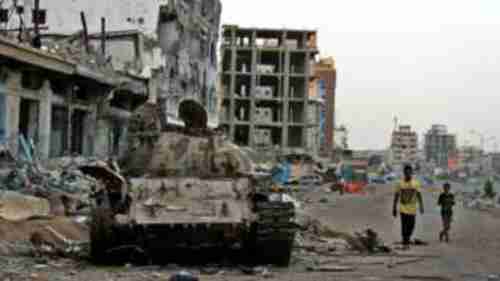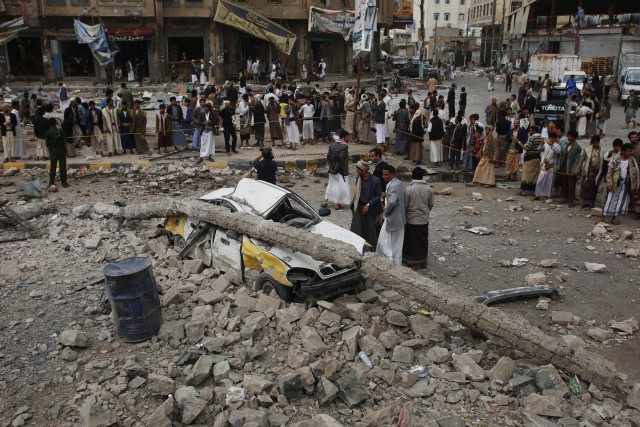This morning’s key headlines from GenerationalDynamics.com
- Yemen’s Houthis sign letter agreeing to peace plan
- Generational frustration grows among West Bank Palestinians
- Russia Ministry of Defense videos found to be deceptive
- The sleazy world of loan sharking — legally
Yemen’s Houthis sign letter agreeing to peace plan

Tank destroyed in clashes between Houthis and government forces in Aden (BBC)
The war in Yemen has not been in headlines much lately, thanks to the growing disaster in Syria, but the status is as follows:
- It is causing one of the worst humanitarian disasters in decades.
- Large numbers of civilians are being killed by airstrikes from the Saudi Arabia-led coalition
- Both the government forces and Houthis are losing many soldiers in battle, in what is almost becoming a war of attrition.
- The Saudis have successfully recaptured much of southern Yemen, starting from the port of Aden.
- However, the government forces have little chance of recapturing the capital city Sanaa, without enormous loss of live on both sides, plus a lot of civilian deaths.
These factors have apparent convinced the Iran-backed Houthi leadership to sign a letter to UN secretary general Ban Ki-moon committing to Ban’s peace plan. The letter commits to a ceasefire, the removal of armed militias from the cities, including Sanaa, and the return of the international recognized government of Abdu Rabu Mansour Hadi to Sanaa.
Signing a letter committing to a ceasefire is possibly a game-changing event. The whole thing could fall apart quickly over negotiations on implementing the peace plan. Or it could be a ploy to gain time to rearm.
The peace plan was put forward by Oman several months ago, and is known as the 7-point Muscat plan, where Muscat is the capital city of Oman. The 7 points are:
- The withdrawal of the Houthis and forces loyal to deposed president Ali Abdullah Saleh from all Yemeni cities and the return of military hardware and munitions seized from the army.
- The restoration of the president Abdu Rabu Mansour Hadi and the government of Khalid Bahah.
- Early parliamentary and presidential elections.
- An agreement signed by all Yemeni parties.
- The conversion of the Houthis into a political party.
- An international aid conference attended by donor states.
- Yemen entering the Gulf Cooperation Council.
According to reports at the time, the plan was approved by both Saudi Arabia and Iran. The Houthis have been holdouts, until now. BBC and Al Araby (24-April-2015)
Generational frustration grows among West Bank Palestinians
Al-Jazeera reporter Hoda Abdel-Hamid was asked to Tuesday to report on the mood of the Palestinians in the West Bank. Here is her response (my transcript):
As Mike Hanna [another reporter] said, there– there is frustration, but I would add to it there’s disillusionment, and lack of hope in the future. Most of the youth who go to these protests and to these clashes are in their late teens and their early twenties. Ever since they were born, they heard about the Oslo Accords, they heard about the two state solution, they’ve been watching summits, and international conferences, but on the ground their reality has actually shrunk with each expansion of the settlements, with each land grab from Israel, with each confrontation – they also grow more and more angry.
So when you talk to people here, the problem is there is no solution inside, there is no political settlement that’s going to come any time soon. And you really feel that they don’t know any more, how to express how frustrated they are, about how things are going. They keep on saying that Israel is shrinking their area of living, their livelihood, they’re taking away land, they also have a lot of concerns about what’s going on around the Al-Aqsa compound, this is gonna bring another turn to this conflict that’s been going on forever. So many will just tell you we don’t believe in anything anymore. Some of the youth also say, well, maybe going back to violence is the only solution ahead – maybe that will put pressure on the international community to bring about a solution.
I think you have these very mixed feelings, people will also tell you, especially a bit older generation, will tell you, well we had Intifada one, we had Intifada two, we’ve paid with our blood, and we still didn’t get anything. So that’s I think really the crux of the dilemma for the Palestinian people. They look forward, but they don’t know what to look at exactly.
This is an interesting because it shows a typical generational split that is present in every society in every country in every era. The kids are ready for violence, but the parents hold the kids back, since they remember how horrific the violence was last time, and how it did not end up the way they wanted.
Still, there is a growing frustration in the Palestinian territories. As I have been writing since May 2003 in “Mideast Roadmap – Will it bring peace?”, Generational Dynamics predicts that Arabs and Jews would be refighting the 1948 war that followed the partitioning of Palestine and the creation of the state of Israel.
Russia Ministry of Defense videos found to be deceptive
Russia continues to claim that its warplanes in Syria are targeting the so-called Islamic State (IS or ISIS or ISIL or Daesh), although numerous reports indicate that Russia’s warplanes are avoiding ISIS targets and are targeting the so-called “moderate” opposition to the Bashar al-Assad regime, including groups that are supported by the United States.
Russia has posted 14 videos showing Russian airstrikes in Syria. Russia claims that all of the videos show ISIS targets being bombed, and many of them claimed that the bombed locations were in Raqqa, an ISIS stronghold.
But a web site called “Bellingcat” claims to have analyzed the videos using geolocation technology and crowdsourcing techniques, and says that the following is true of 12 of the videos analyzed so far:
- 3 videos were verified as being in locations matching the title and description of the videos. In all 3 videos the targets of Russian bombing are described as “terrorists” rather than ISIS, which is taken as a catch all term for armed Syrian opposition groups.
- 5 videos gave locations that were accurate, but described the attacks as targeting ISIS when there is no known current ISIS presence in those areas.
- 2 videos gave the location as Raqqa, but were in fact filmed over 100 miles west of Raqqa in areas with no known ISIS presence.
- 1 video gave no location, but was geolocated to an area where there was no known ISIS presence, despite the title of the video claiming otherwise.
- 1 video gave a location at the entrance to Ma’aart al Nu’man but was geolocated to an area 20km away from Ma’aart al Nu’man.
The web site called “Bellingcat” calls itself “by and for citizen investigative journalists,” and is presumably named after the ancient “Belling the cat” fable.
There is no independent verification of the Bellingcat findings, but they are consistent with the fact that, as we learned with the Ukraine invasion and now the Syria incursion, Russian officials can never be believed. Bellingcat analysis
The sleazy world of loan sharking — legally
The story of how two ultrareligious men, Abe Zeines and Meir Hurwitz, made ridiculous profits by lending money to desperate business owners, usually immigrants:
With no competition, Second Source could charge whatever it wanted. The standard deal it offered small businesses was to borrow $9,000 and pay back $120 a day for six months, or a total of $14,500, equivalent to an interest rate of 250 percent a year. That’s 10 times the legal limit in New York state, which made it a crime in the 1960s to charge more than 25 percent. To get around that, merchant cash-advance companies argue they aren’t actually charging interest—they’re buying the money businesses will make in the future, at a discount. As long as nobody uses the word “loan,” it usually holds up in court, says Robert Cook, a lawyer who advises the industry. Another no-no is chasing down an individual to collect if the business fails. Merchant cash advance is a supercharged version of “factoring,” the age-old practice of trading the right to collect unpaid bills in exchange for cash upfront.
As I have been pointing out for many, many years, bankers created the financial crisis by selling fraudulent synthetic subprime-mortgage backed securities. Since nobody was punished, they went on to commit fraud in the Libor and Forex scandals. All this has come about since the rise of Generation-X starting in 2000, after which white collar crimes are never prosecuted, as long as they give a substantial portion of their fraudulent gains to politicians as campaign contributions. Now we have loan sharks making tens of millions of dollars by legalized loan sharking. Until some of these people are put in jail, these activities are not going to stop. Bloomberg
KEYS: Generational Dynamics, Yemen, Houthis, Iran, Saudi Arabia, Abdu Rabu Mansour Hadi, Aden, Sanaa, Ali Abdullah Saleh, Muscat, Oman, Hoda Abdel-Hamid, West Bank, Islamic State / of Iraq and Syria/Sham/the Levant, IS, ISIS, ISIL, Daesh, Russia, Syria, Bashar al-Assad, Bellingcat, Abe Zeines, Meir Hurwitz
Permanent web link to this article
Receive daily World View columns by e-mail

COMMENTS
Please let us know if you're having issues with commenting.